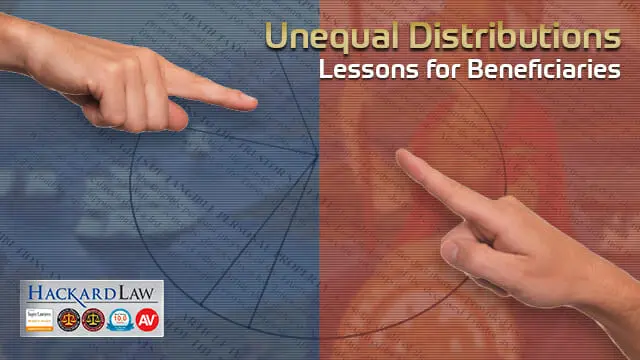
California Trust Beneficiary Lessons | Unequal Distributions
Several years of legally representing abused estate heirs and trust beneficiaries in California’s Superior Court system, both civil and probate, provide lessons worth noting.
The first is that family dysfunction is not cured by the rigors of litigation. At best it is minimized and at worst exacerbated. The second lesson is that mediation, as process toward resolution, works. While mediation will not recast the dynamics deep in family history it will often provide an opportunity to equalize estate or trust distributions. It is not a perfect system.
Wills and trusts formed by undue influence and/or undermined by legal incompetency aren’t easily surrendered by those financially advantaged by their wrongdoing. Parties to a mediation should not expect an apology. Even less, a commitment to equality.
Intrafamily sentiments are not dissolved in a mediation process. Polarization usually continues. This is not the preference of the mediator or the parties’ attorneys. We know that we cannot cure what is often at the heart of family controversies.
Surviving stepmothers, far more likely to outlive their spouses, will regularly face controversies from stepchildren who are cut out of their father’s estate plan. Stepchildren will often face headwinds from biological children even when an estate provides for equal distribution between them. Nieces or nephews exercising late in life interest in the fortune of an unmarried and childless aunt or uncle often stiff opposition from the deceased relative’s surviving siblings.
While the concept of unequal distributions may strike at the heart of family traditions, emotions run even higher when an outside interloper recasts a long-held estate plan. Caregivers are a frequent target of estate and trust litigation. Families little appreciate deathbed wills and trusts that benefit a caregiver, maybe even make the caregiver the sole heir, to the exclusion of the decedent’s loved ones.
The trustee industry, licensed and corporate, face their own unequal distribution challenges. It is not unusual to see annual trustee charges exceed distributions to trust beneficiaries. On its face, this inequality seems outrageous.
Settlors, the makers of trusts, don’t consciously choose to have an outsider benefit more from their trust than their loved ones. This fact may fall on deaf ears to a tone-deaf trustee who argues that their preeminent task is the marshalling of assets. The obvious question – marshalling assets for whom? Them? Or, the beneficiaries?
Lessons learned over the years from litigating trust and estate disputes are helpful to their resolution. Family healing is an entirely different task. It’s one not solved by lawyers.
At best, we can try to apply the principle that physicians embrace, “First, do no harm.” The principle is better applied to counseling against vengeance when a scorched-earth campaign against a wrongfully formed estate or trust will do more harm than good.
Hackard Law represents foreign, out of state and California clients in the Superior Courts of California that oversee civil and probate disputes. We focus on substantial cases where we think that we can make a significant difference and there is a party who can be financially accountable for their wrongdoing.
Our geographic preference for representation is in California’s largest urban areas, including Orange, Los Angeles, Santa Clara, San Mateo, Alameda, Contra Costa and Sacramento Counties.
If you have an unequal distribution case that may involve undue influence, fraud, mistake or lack of capacity and you want to talk about it, call us at Hackard Law (916) 313-3030. We’ll be happy to hear your story.

 (916) 775-8542
(916) 775-8542